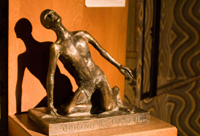| Notes: | "When he heard that it was Jesus of Nazareth, he began to shout out and say, "Jesus, Son of David, have mercy on me!" Many sternly ordered him to be quiet, but he cried out even more loudly, "Son of David, have mercy on me!" Jesus stood still and said, "Call him here." And they called the blind man, saying to him, "Take heart; get up, he is calling you." So throwing off his cloak, he sprang up and came to Jesus. Then Jesus said to him, "What do you want me to do for you?" The blind man said to him, "My teacher, let me see again." Jesus said to him, "Go; your faith has made you well." -- Mark 10:47-52a "When Jesus grants [Bartimaeus'] request "to see again" by saying, "Your faith has saved you", Bartimaeus "immediately saw again and followed him on the way." In the Gospel of Mark, Jesus' healing does not necessarily elicit a response of following after him. For example, the healing of the paralytic in 2:12, the healing of the woman with a flow of blood in 5:34, and the healing of the blind man in 8:26 all have a miracle as a central narrative element, but there is no reponse by the beneficiary that involves following Jesus...This episode begins a series of passages that portrays Jesus as a Davidic figure, but here the first impulse by Mark is not to stress David's royal, earthly, militaristic, or political qualities. Instead, by contructing the story of the healing of the blind Bartimaeus in such a way as to combine the title "Son of David" with the healing of a reliable character, he stresses the tradition of healing that is associated with Solomon as the son of David." (Ahearne-Kroll, 140) |
|---|

